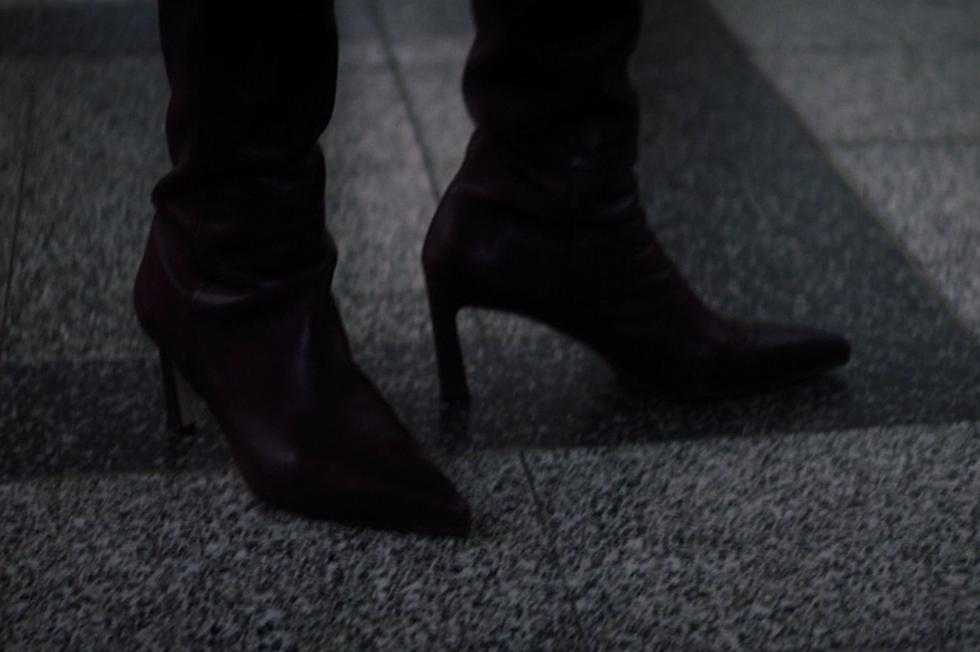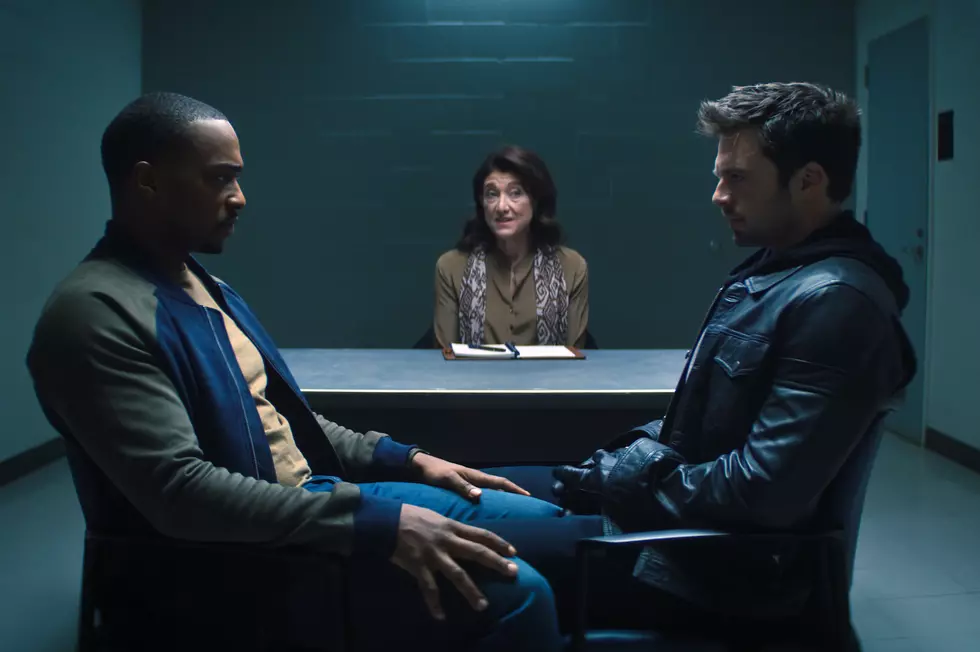![Tom Gauld On ‘Mooncop’, His Melancholy Comedy About A Cop On The Moon [Interview]](http://townsquare.media/site/622/files/2016/09/mooncop-cover.jpg?w=630&h=785&zc=1&s=0&a=t&q=89&w=980&q=75)
Tom Gauld On ‘Mooncop’, His Melancholy Comedy About A Cop On The Moon [Interview]
Imagine it --- human beings, living on the moon! This thrilling fantasy of the baby boomer generation, which in the 20th century seemed like a practical, even inevitable part of the future, has now become part of the past. We're living in what was once the far-flung future, and the idea of a lunar colony seems quaint, an item of an old-fashioned future that belongs in the same dusty museum where the flying cars, laser pistols and robot butlers are kept.
British cartoonist Tom Gauld has imagined it, and in his new graphic novel Mooncop he imagines an actualization of the lunar colony concept of moonshot-era pop culture, and what that colony might be like had it been built and followed the path of our collective gradual disenchantment with space.
His lonely lunar colony, patrolled by a lonely law enforcement officer with only the smallest of civic concerns to attend to, has the melancholic feel of a rust-belt small town on its last legs, the sort of place where people seem to leave as quickly as possible... only here the simmering sense of tragedy is compounded by what the colony itself once represented.
Gauld, whose last published book was the 2013 collection of cartoons and comic strips You're All Just Jealous of My Jetpack, employs his signature simple style in service of a story that is at once an accomplished work of deadpan comedy and a meditation on the passage of time. ComicsAlliance took the opportunity of the release of Mooncop to talk to Gauld about his inspiration and his work.
ComicsAlliance: I found it somewhat ironic that your follow-up to You’re All Just Jealous Of My Jetpack, a line spoken from a character representing "science fiction" to tut-tutting characters representing "proper literature," is something of a blend of the two. Or, at the very least, has the trappings of science fiction (but no jetpacks). Can you tell us a little about where the idea for this story first came from?
Tom Gauld: I grew up reading 2000 AD, the British sci-fi comic that featured Judge Dredd, and I've always had a fondness for science fiction. Some of my earliest comics, which I made while at college, were short strips about two astronauts on the moon who had very down-to-earth problems: can't work camera, getting lost, bickering. I liked this idea and wanted to do more with them, but couldn't come up with a story that felt worthwhile.
The idea was re-ignited when I saw a picture of a tin toy "space patrol" car from the 1960s. The toy suggested to me a time when people really thought we might live on the moon, and that there would be enough life up there to require a police force, but the packaging showed the vehicle patrolling a completely empty moonscape. The idea of a well-equipped policeman, pointlessly patrolling an empty moon, came to me right away, and I very quickly noted down the basics of the Mooncop story in my sketchbook.
CA: This might be a silly question given what you mentioned about the specific inspiration, but why the moon versus other, potentially futuristic and fantastical settings? Is the moon a funnier setting than, say, Mars or the bottom of the ocean, or is it that our fascination with the moon as a place to explore has seemingly passed?
TG: I like the dated-ness of the idea of living on the moon. It seems to come from a time when we were more simply optimistic about science and technology's ability to change our lives for the better. It seems amazing that the moon was there for millions of years and humans looked up in wonder, then we went there, and for a few years people were bouncing around, playing golf, driving a car etc. Now, again, it's completely lifeless and has been for more than forty years.
CA: Re-reading You’re All Just Jealous... after Mooncop, I couldn’t help but notice that similarities between the "science fiction" character (who shows up again in a relationship with a serious literary character) and the Mooncop. Is the former the latter in some larval form?
TG: The Jetpack cartoons are made one per week for the Guardian, so I work on them alongside whatever longer projects I have going on, and they feed into each other. Mooncop was gestating for quite a long time, so was influenced by a few of the weekly cartoons. In both versions, the character design is a kind of outdated throwback to pulpy sci-fi of the past.
CA: One of the fascinating aspects of this book is that it sets what we might consider "the future," with hover-cars and robots and a lunar colony, in the past, with the entire moon feeling like a lonely exurb after the big, job-providing plant has closed down. How interested are you in the idea of the past’s vision of what the future might look like, which can seem so quaint once we have passed that point?
TG: That was definitely in mind when I was making Mooncop. I was particularly thinking of Stanley Kubrick's 2001, whose "future" is now fifteen years ago, but is so well imagined and beautifully presented that it still stands up.
I conceived my moon colony as maybe being the one from 2001, but twenty years later, when things have begun to get a little worn, to fray a bit at the edges. The atmosphere in Mooncop relies a bit on the reader feeling the difference between the sci-fi worlds and stories usually presented --- in comics, books, TV and movies --- and the Mooncop's world.
CA: There’s a scene where Mooncop tells the woman at the doughnut shop, "Since I was a boy, I’ve dreamed about being a cop and living on the moon." It’s a pretty quaint combination of two child-like dreams, and I can’t help but wonder if you had your own lunar fantasies when you were a boy? What did you want to be, and where did you want to live when you were a boy?
TG: I think I probably did have idle fantasies about going into space and holidaying on the moon. I grew up in the '80s, so the space race/moon dream was pretty much over, but I'd read dated library books, which had a confusing mixture of hard science and utopian science fiction. I remember one book that said that "some experts predict" that there would be a moonbase by 2001, and that the 2020 Olympic games could be held up there. I spent a lot of time drawing spaceships and making them out of Lego and poring over Star Wars films, toys and comics.
CA: As someone whose works have included longer-form graphic novels as well as comic strips or single-panel cartoons, can you tell us a little bit about transitioning from the different types of comics? Does either come more naturally to you than the other, or is either more rewarding than the other?
TG: The short weekly cartoons that I do for the Guardian and New Scientist definitely come to me more naturally than longer stories. I can generally do one in a day, and I enjoy the constraints of the format: small size, short deadline, specific theme. Because I've done lots of these short cartoons, I don't overthink the ideas, I just go for whatever seems amusing or interesting to me in the moment and I think, if it fails, then there's always next week.
The longer books and stories are much more of a challenge for me. It's much harder to come up with an idea that feels worthy of a whole book, then it's a real battle to shape it into a good story. However,there is so much more space to play with in a graphic novel, and I can do things that would never fit into the short comics.
A mixture of the two styles suits me well. I think I'd go mad trying to make graphic novels all the time, but I'd miss the challenge if I was only making short comics.
CA: Can you tell us a bit about your artistic style? I think it’s safe to say that it appears very simple, and abstracted to a degree, but it’s a very accomplished sort of simplicity that is representative. Have you always drawn in this style, or was it a process to arrive at this particular style and degree of detail vs. abstraction? Do you recall a particular, eureka-like moment where you felt like you found your own style, or do you feel like it’s still an ongoing process?
TG: I spent seven years at art school and tried all sorts of drawing styles, but when I got into drawing comics I found that a simple style worked best. I gave up trying to be "artistic" and just used the type of drawing I'd naturally revert to when I wasn't thinking too much: the style I'd use for a silly cartoon to amuse a friend, or to draw a map or an idle telephone doodle. I've tried to improve as I've gone along, and I hope I'll never be stuck with a fixed, unchanging style. I want the images to be simple and clear, but with a bit of human warmth, a bit of handmade wobble in the lines, to stop it seeming completely diagrammatic and cold.
CA: If readers are only familiar with your work from You’re All Just Jealous of My Jetpack, do you think they will be surprised by this work?
TG: I hadn't really considered this, but yes, I think some might be. There are definitely connections between the two books, but the form is quite different. I know quite a lot of people who don't normally read comics have found their way into my longer work via the short cartoons, which is great. I know that some comics can be quite intimidating for people who read only prose, but I try to keep things simple in the hope that anyone who is interested will get it.
Comics Five Best Science Heroes
More From ComicsAlliance






![Colinet And Charretier Announce ‘The Infinite Loop Volume 2: Nothing But The Truth’ [Exclusive Interview]](http://townsquare.media/site/622/files/2017/03/Loop01.jpg?w=980&q=75)
![Five Stars: Starting At The End With Jeff Smith [Interview]](http://townsquare.media/site/622/files/2017/03/FiveStars-Smith.jpg?w=980&q=75)
![Take Me to Your Teacher: Trevor Mueller and Gabo Discuss ‘Albert the Alien’ [Webcomic Q&A]](http://townsquare.media/site/622/files/2017/03/0ALBERTVOL3_COVER_notitle-copy.jpg?w=980&q=75)
